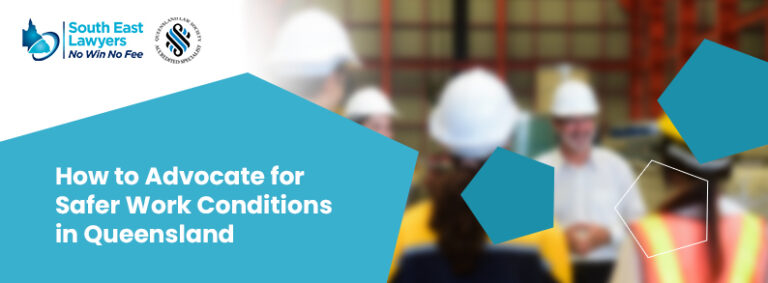Have you been injured or become unwell either at work or on your way to or from work?
You may or may not be aware that you could be entitled to worker’s compensation to help you manage your recovery costs and living expenses. Worker’s compensation can be complicated and a bit overwhelming, but today, we’re going to help to make the compensation law a bit easier to understand.
Here’s the ultimate guide on how you can get your benefits while recuperating from your work-related injury or illness.
What is workers’ compensation?
Whether you’re a fresh grad starting your first job or a tenured employee, it’s important to know that if you’re injured while working, you may be entitled to workers’ compensation in Australia.
Workers’ compensation is a type of insurance that your employer is required to have by law, and it’s designed to protect you if you’re injured on the job – or while travelling to and from your job.
In Queensland, worker’s compensation is provided under WorkCover and essentially provides financial support and benefits to workers who are injured on the job or become ill as a result of their work. This includes injuries that happen suddenly, such as a fall or a burn, as well as injuries that develop over time, such as repetitive strain injuries.
If you’re injured on the job, the first thing you should do is report the injury to your employer. Your employer will then provide you with a claim form to fill out, which will start the process of applying for workers’ compensation.
Who is eligible for worker’s compensation in Queensland?
In Queensland, most workers are eligible for workers’ compensation if they are injured or become ill as a result of their work. This includes:
- Full-time and part-time employees
- Casual employees
- Self-employed workers who have opted in to the workers’ compensation scheme
- Some contractors, depending on their working arrangements and the nature of their work
- Volunteer workers who perform work for an organization or business
However, there are some exceptions and restrictions to who is eligible for workers’ compensation.
For example, workers who are injured while under the influence of drugs or alcohol may not be eligible for benefits. It’s also important to note that workers must report their injury or illness to their employer as soon as possible after it occurs, or they may not be eligible for benefits.
Benefits Under Workers’ Compensation
Workers’ compensation provides a range of benefits to workers who are injured or become ill as a result of their work. These benefits include:
Medical and rehabilitation expenses
Workers’ compensation covers the cost of reasonable and necessary medical treatment related to your work injury or illness, including doctor visits, hospital stays, and physical therapy. It can also cover the cost of rehabilitation services to help you recover and return to work.
Wage replacement benefits
If you are unable to work due to your work injury or illness, workers’ compensation can provide wage replacement benefits to help cover your lost wages.
The amount of wage replacement benefits you receive depends on your average weekly earnings prior to your injury and may be subject to certain caps and limitations.
Lump sum compensation
In some cases, workers’ compensation may provide a lump sum payment to compensate you for the permanent impairment resulting from your injury or illness. The amount of compensation you receive depends on the degree of impairment and other factors.
Death benefits
If a worker dies as a result of a work-related injury or illness, workers’ compensation can provide death benefits to the worker’s dependents.
Return-to-work assistance
Workers’ compensation can also provide assistance with returning to work after a work-related injury or illness, including vocational rehabilitation and job search assistance.
Work-Related Injuries & Illnesses Covered by Workers’ Compensation
Some common examples of work-related injuries and illnesses that are covered by workers’ compensation in Queensland include:
Physical injuries caused by accidents and repetitive motions
- Fractures
- Dislocations
- Sprains
- Cuts
- Burns
- Carpal tunnel syndrome
- Back pain.
Occupational diseases caused by hazardous substances or environments
- Mesothelioma
- Asbestosis
- Hearing loss
- Other respiratory illnesses caused by exposure to dust, chemicals, or other harmful substance
Psychological injuries caused by work-related stress, bullying, and harassment
- Depression
- Anxiety
- Post-traumatic stress disorder (PTSD)
Aggravation of pre-existing conditions
Pre-existing medical conditions such as arthritis may be aggravated while performing your job duties.
How long do I have to report a workplace injury or illness?
The Workers’ Compensation and Rehabilitation Act 2003 requires that you report the injury or illness to your employer within 30 days of becoming aware of it, unless there are exceptional circumstances that prevented you from reporting it within this timeframe.
It’s recommended that you report the injury or illness to your employer as soon as it occurs, or as soon as you become aware of it, to ensure that you receive timely medical treatment and support, and to preserve your rights to workers’ compensation benefits.
Failing to report a workplace injury or illness within the required timeframe may result in delays or denial of workers’ compensation benefits. It may also impact your ability to pursue legal action or claim damages from your employer.
Can I claim workers compensation for a car accident while travelling to and from work?
If you suffer an injury while you were travelling to or from work, you could potentially be covered by WorkCover in Queensland. A claim made for an injury caused during travel to or from work is known as a “journey claim”.
A journey claim could include travelling between your workplace and your home, your workplace and a training facility or location that is required as part of your work, and travel between workplace with one employer to a workplace with another employer.
It’s important to note that you may not be covered in the instance of an injury occurring when travelling any of the above journeys if you caused an accident by breaking road rules, you were intoxicated, you were acting recklessly, or if you had not left your home yet.
Every situation will involve unique circumstances, so if you have been injured on your way to or from work, it’s best to seek legal advice to understand your options before making any claims.
Workers compensation vs common law claims
Workers’ compensation is a no-fault system that provides benefits to employees who are injured or become ill as a result of their work. These benefits may include payment of medical expenses, income replacement, and rehabilitation services.
Workers’ compensation is designed to provide a safety net for injured workers and is available regardless of who was at fault for the injury or illness.
On the other hand, common law claims are legal actions that allow injured workers to seek compensation for damages that go beyond what is available through workers’ compensation. These damages may include pain and suffering, loss of enjoyment of life, and loss of future earnings.
Unlike workers’ compensation, common law claims require that the worker proves that their employer was negligent or breached their duty of care, and that this negligence caused the injury or illness.
Is there an impairment threshold for common law claims?
Yes, in Queensland, there is an impairment threshold that must be met in order to pursue a common law claim for a work-related injury or illness. This is known as the “15% threshold”.
Under the Workers’ Compensation and Rehabilitation Act 2003, an injured worker can only pursue a common law claim if their injury or illness has resulted in a permanent impairment that exceeds the 15% threshold. This means that the worker’s impairment must be assessed as being at least 15% or greater before they can pursue a common law claim.
Filing a worker’s compensation claim
Here’s how you can lodge a claim:
- Report your injury or illness to your employer, preferably within 24 hours. You can do this verbally or in writing, but it’s a good idea to do it in writing so you have a record.
- If your injury or illness requires medical treatment, you should seek treatment from a doctor or healthcare provider as soon as possible and secure a workers’ compensation medical certificate.
- Your employer should provide you with a claim form to complete. This form will ask for details about your injury or illness, your employment, and your medical treatment. You should complete the form as accurately and thoroughly as possible.
- Once you have completed the claim form, you should lodge it with your employer or directly to WorkCover Queensland. You can do this by sending it in the mail, by email, or by fax. Make sure to keep a copy of the claim form for your records.
- Your employer or their insurer will review your claim and may request additional information or documentation. It’s important to follow up with them to ensure that your claim is being processed in a timely manner.
While the process may seem simple (and in some instances, it can be), it’s a good idea to seek legal advice from a compensation lawyer who offers worker’s compensation claim services. It’s easy to underestimate your rights and the claims process can be confusing but a compensation lawyer can guide you through the process and in many instances, ensure that you get the maximum entitlements that you’re eligible to.
How is the compensation amount calculated?
The amount of compensation you are entitled to receive for a work-related injury or illness in Queensland will depend on a number of factors, including:
- Your average weekly wage at the time of your injury or illness
- The nature and severity of your injury or illness – the more severe your injury or illness, the higher the amount of compensation you may be entitled to receive
- The type of benefits you are eligible for – that includes medical expenses, rehabilitation expenses, and income replacement benefits
- Whether you are partially or totally disabled – depending on your disablement, you may receive partial of full compensation
As we mentioned earlier, seeking legal advice can be extremely helpful when making a worker’s compensation claim. We can help you understand all of your options and plan for your claim.
Can I choose my own doctor for a worker’s compensation claim?
Under the Workers’ Compensation and Rehabilitation Act 2003, you have the right to choose your own treating doctor, specialist, and allied health practitioner for the initial treatment of your work-related injury or illness. However, your choice of doctor must be reasonable and appropriate for the nature of your injury or illness.
If you are not satisfied with the treatment you are receiving from your doctor, you should discuss your concerns with your doctor and consider seeking a second opinion. You may also want to speak with your employer, the Workers’ Compensation Regulator, or a workers’ compensation lawyer or specialist to understand your options.
Can I return to work while receiving worker’s compensation benefits?
Yes, you may be able to return to work while receiving workers’ compensation benefits in Queensland. In fact, returning to work as soon as possible can be beneficial for your recovery and can help you to maintain your income and job security.
If you are able to return to work, your employer may offer you suitable duties or modified work that accommodates your injury or illness. This may involve adjustments to your regular duties or working hours to help you ease back into work gradually.
If you do return to work, your workers’ compensation benefits may be adjusted based on your income from work. For example, if you are working part-time, your workers’ compensation benefits may be reduced but not cut-off.
How long does it take to receive worker’s compensation benefits?
The length of time it takes to receive workers’ compensation benefits in Queensland can vary depending on a number of factors, including the severity of your injury, the complexity of your claim, and how quickly your claim is processed by your employer’s workers’ compensation insurer.
Once your claim has been submitted, your employer’s insurer has 20 business days to decide whether to accept or reject your claim. If your claim is accepted, you may start receiving benefits soon after the decision is made. However, if your claim is rejected, you may need to appeal the decision, which can take longer.
Can I seek additional compensation if my workplace injury or illness worsens over time?
Yes, you may be able to seek additional compensation if your workplace injury or illness worsens over time in Queensland.
Under the Workers’ Compensation and Rehabilitation Act 2003, you have the right to claim for any deterioration in your condition that is a result of your original workplace injury or illness. This is known as a “deterioration claim.”
To make a deterioration claim, you will need to provide medical evidence that your condition has worsened, and that the deterioration is related to your original workplace injury or illness. You may also need to undergo medical assessments and reviews as part of the claims process.
What should I do if my worker’s compensation claim is denied?
If your workers’ compensation claim is denied in Queensland, you may be able to appeal the decision. Here are some steps you can take:
· Review the decision
Carefully review the letter from the workers’ compensation insurer explaining why your claim was denied. Make sure you understand the reasons for the decision.
· Seek medical evidence
If you disagree with the insurer’s decision, you may want to seek additional medical evidence to support your claim. This may involve getting a second opinion or requesting further tests or medical assessments.
· Lodge an appeal
If you wish to challenge the insurer’s decision, you can lodge an appeal with the Workers’ Compensation Regulator. The appeal process may involve a review of the decision by an independent assessor or a hearing before a workers’ compensation tribunal.
· Seek legal advice
If you are considering lodging an appeal, you may want to seek legal advice from a workers’ compensation lawyer or specialist. They can help you understand your rights and options and even represent you throughout the appeals process.
Can I get a second opinion on workers compensation?
If you have concerns about the medical treatment or assessment provided by the medical practitioner selected by your employer’s workers’ compensation insurer, you have the right to request a second opinion. You can choose to see a different medical practitioner of your own choice, although you should first discuss this with your employer and the insurer.
In some cases, the insurer may require you to see their chosen medical practitioner for a further assessment. However, you are entitled to receive a copy of the report prepared by the medical practitioner, and you can seek a second opinion if you have concerns about the assessment or treatment provided.
What should I do if my employer does not have worker’s compensation insurance?
If your employer does not have workers’ compensation insurance, you should report this to the Workers’ Compensation Regulator in Queensland. The regulator is responsible for enforcing compliance with workers’ compensation laws and can take action to ensure that your employer meets their legal obligations to provide workers’ compensation insurance.
You can report your employer to the Workers’ Compensation Regulator by completing an online form on their website or by calling their helpline. The regulator may investigate your employer’s compliance with workers’ compensation laws, and can take enforcement action if necessary, including imposing fines or prosecuting your employer for non-compliance.
If your employer does not have workers’ compensation insurance and you are injured or become ill as a result of your work, you may still be entitled to claim compensation. In this situation, you may be able to make a common law claim against your employer for damages, which can include compensation for medical expenses, loss of income, and pain and suffering.
It’s important to seek legal advice if your employer does not have workers’ compensation insurance, as the claims process can be complex and may involve a range of legal and financial issues.
Reasons Why You Need a Workers’ Compensation Lawyer
If any of these things happen to you, you might want to consider talking to a compensation lawyer to help you sort things out.
1. Your claim has been denied
If your workers’ compensation claim has been denied, a lawyer can help you appeal the decision and ensure that you receive the compensation you are entitled to.
2. You are receiving inadequate benefits
If you are receiving inadequate benefits for your injury or illness, a lawyer can help you understand your rights and fight for the compensation you deserve.
3. You are facing retaliation from your employer
If your employer is treating you unfairly or retaliating against you because you filed a workers’ compensation claim, a lawyer can help you protect your rights and take legal action if necessary.
4. Your injury or illness is serious or disabling
If your injury or illness is serious or disabling, a lawyer can help you understand your long-term needs and ensure that you receive the appropriate medical care and financial support.
5. You have a pre-existing condition
If you have a pre-existing condition that is exacerbated by your work, a lawyer can help you navigate the complexities of your claim and ensure that you receive the compensation you deserve.
6. You have questions about the claims process
If you have questions about the workers’ compensation claims process or need help completing paperwork, a lawyer can provide guidance and support to ensure that your claim is handled properly. The process isn’t easy, especially when you’re dealing with an injury but that’s what a compensation lawyer is there is help with.
Get the compensation you deserve
If you have been hurt or fallen sick at work in Queensland, we’ll make sure that your rights are protected and that you’ll get the benefits that are rightfully yours. Contact us today and get a FREE review of your case!






